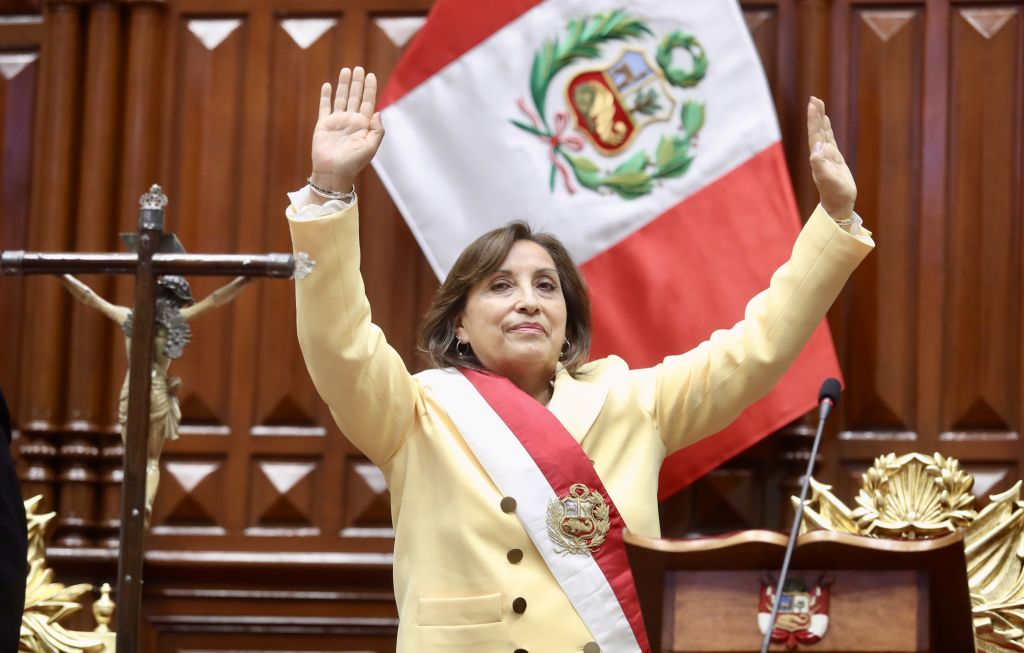The election of Peru’s first female president Dina Boluarte should have been a triumph. But feminists aren’t celebrating. Instead, the country remains in chaos as protesters continue to call for her resignation and international organizations accuse her of human rights abuses.
When Boluarte was abruptly sworn in on Dec. 7, 2022, the fact that she was the first female president in Peru’s 201-year history was widely noted, yet barely explored by Peruvian media. Journalists had other things on their minds: her inauguration took place just hours after her predecessor Pedro Castillo was impeached for attempting to dissolve Congress and rule by decree, bringing down the curtain on a 17-month administration that had tipped the Andean republic into unremitting political instability and chaos.
The youngest of 14 children from a working-class family in the remote Andean market town of Chalhuanca, nearly 10,000 feet above sea level, Boluarte said in her maiden presidential speech that her priority would be to fight for “the nobodies, the excluded, the others, to have the opportunity and access that has historically been denied to them.”
“More than a politician, I am a Peruvian citizen and mother who fully understands the high responsibility that history has put on my shoulders,” she declared. “Responding to that high responsibility is [a show of] my respect for the millions of Peruvian mothers who day after day provide sustenance for their families.”
But three months since her swearing in, her presidency has descended into a dark mess of severe human rights violations, its legitimacy decimated by allegations of principle-free political opportunism, brutal authoritarianism, and racism. At the time of writing, 48 Peruvians had been killed by security forces, some while protesting violently; some while demonstrating peacefully; and some who were just bystanders, including a medical intern treating an injured protester. Another dozen people died after protestors’ road blockades prevented them from receiving emergency medical treatment, and one police officer was found dead in a burnt-out patrol car.
In a searing report released in February, Amnesty International warned that Boluarte had presided over an out-of-control police and armed forces that, motivated by “systemic racism ingrained in Peruvian society,” had repeatedly violated international human rights standards by using “lethal ammunition to control demonstrations.” Many Peruvians view Boluarte as having blood on her hands. Three-quarters want her to resign.
It looks increasingly inevitable that Peru’s first ever female president will face a similar fate to Castillo, the country’s first ever campesino president (in Peru, the term means someone of indigenous ancestry who works the land), with a post-presidency dogged by legal problems and a potentially lengthy jail sentence.
“We are not celebrating her presidency,” Indigenous feminist activist Tarcila Rivera Zea said. “For us, it has meant pain and sadness, with so many deaths. More than anything else, it is a feeling of frustration and disappointment.”
Far from being carried on the back of a feminist wave, Boluarte’s rise to power came at a particularly challenging time for gender rights in Peru, even as some other Latin American nations have been relaxing restrictions on abortion and increasingly tackling gender violence. Peru was already one of the most socially conservative societies in Latin America, with what are thought to be some of the highest rates of sexual violence in the region, and where abortion is only allowed in cases where the mother’s health is at risk.
It is unclear whether Boluarte has ever identified with the feminist movement, although she has shown an appreciation of gender issues. “[Boluarte’s] not a feminist in the sense of a feminist activist,” Alexandra Ames, a political scientist at Lima’s University of the Pacific, said. “But she’s definitely a woman who feels that she has got ahead by working hard, harder than men would normally have to, and seems to have that awareness.”
In fact, Free Peru’s campaign manifesto was even accused of advocating “machismo Leninism” for accusing the state of “subcontracting” its obligation to provide for the children of separated parents to absent fathers by requiring them to pay child support.
And while she was vice president, Boluarte also served as minister for development and social inclusion, a role that would normally have a strong gender component. During that time, gender rights came under a sustained assault from lawmakers, one that might have been met with effective resistance from a different executive.
Members of Congress sought to further restrict already highly limited abortion rights with a blanket ban, and change the name of the Ministry of Women to the Ministry for the Family—a switch that could have potentially life-and-death policy consequences in Peru’s machista society for women facing abusive partners, for example.
But the most damaging counter reform has been a new law allowing parents to block classes with a gender focus—or, as Peruvian conservatives call it, gender ideology.
First introduced to the national curriculum in 2004, gender focus concepts, which include sex education, were aimed at raising awareness among boys and girls of the harms caused by Peru’s patriarchal culture—everything from wage disparities to femicide. Conservatives, often fundamentalist evangelical Christians, caricature gender focus as “cultural Marxism” that encourages premature sexual activity and pressures children into homosexuality and transgenderism.
Throughout the debate over the curriculum, Boluarte was notable for her silence. She did, at different points during her work as a minister, show protocolary support for gendered development policies, including to empower indigenous women. But she failed to provide any substantive leadership, much less confront the attack on gender focus.
“It’s also a lesson learned,” Rivera Zea says. “What her presidency shows is that it is not enough to be a woman or speak Quechua if you don’t have that sensibility or identification with the historically excluded. She could have been a president who showed strength, wisdom, justice, and respect for human rights. Instead, she has aligned herself with the worst in Peruvian politics.”
Read more of our coverage of the crisis in Peru in Foreign Policy.


 Simeon Tegel
Simeon Tegel
